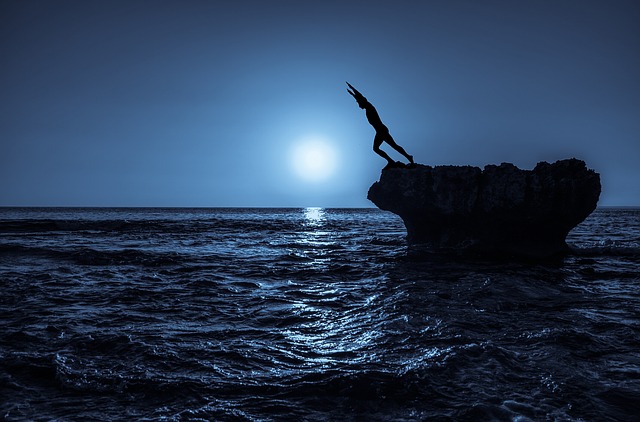Is It Dangerous To Swim In The Ocean At Night? Yes, And…

Is it dangerous to swim in the ocean at night? Yes.
Swimming in the ocean at night is dangerous. Particularly for inexperienced swimmers, ocean swimming at night can present a greater risk than ocean swimming during the day. This is brought on by the loss of vision in the dark, the absence of nearby humans, and the nocturnal habits of ocean predators.
Table of Contents
Swim In The Ocean At Night Risks
According to the National Ocean Service, these are a few of the risks:
Sharks
Stay mostly in deep water. Avoid going into waters that are murky so you can see it clearly. Keep an eye out for wave breaks as well, as they occasionally swim alongside the waves. Sharks have been known to be drawn to splashing water and shiny objects, and this could be more dangerous at night.
Shore Breaks
Deep waters that flood back to the shore in large quantities are what cause shore breaks. They are much more intense than a typical wave and can hurt your neck or spine because they can knock a swimmer to the bottom or cause them to hit a rock surface.
Water Contamination
All kinds of debris and pollutants are carried by the water as it flows from the shore and settles in the ocean. It usually occurs after a period of intense rain. The swimmer might be harmed if this reaches a toxic level and harbors bacteria-causing organisms.
Lighting
It may hit the water and discharge deadly charges that could seriously harm the swimmer.
Rip Currents
People are among the many things these currents are known to transport to the deep waters. Being caught in one would make it impossible for you to escape because they are unpredictable. Drowning could result from swimming against this kind of current. In order to avoid becoming exhausted while caught in a current, it is advised to move with it. Once they’re done, turn around.
Jellyfish
Most jellyfish are not actually poisonous. However, staying away from the ocean at night may spare you from their painful sting. They are much easier to see during the day.
Stingrays
These aquatic creatures can be found in the ocean. Normally, they make an effort to avoid stepping on people, but if they do so by accident, their burrs could pierce your skin. Toxins found in the burbs may cause an area to swell or even cause a muscle cramp.
Is Ocean Swimming At Night Just As Safe As During The Day?
The danger associated with some of these risk factors is increased when swimming at night, even though these risk factors exist both during the day and at night.
This is due to two main factors:
Visibility Is Decreased
Being in the dark while swimming in the ocean is nighttime swimming. This makes it much harder to keep track of your location in relation to the shore than it is during the day.
Rip currents and shore breaks can be harder to see in the dark. The inability to locate the shore could prevent you from successfully escaping a rip current if you become stuck in one.
Simple disorientation brought on by the darkness, particularly on a moonless night, can cause swimmers to swim farther out into the ocean than they are physically capable of returning. You can maintain your bearings by selecting a location with a well-lit shoreline.
The bottom is harder to see when there isn’t enough sunlight. Some marine organisms become more active at night. Wearing swimming shoes, like these ones from Amazon, will make walking back toward shore safer as you step on the ground. Otherwise, you run the risk of stepping on a sea urchin or a sharp rock, which can be uncomfortable.
Additionally, it is simpler to accidentally swim in murkier water that might be tainted by chemical or microbial pollutants when it is dark.
Few Or No People
Beaches will have beachgoers on land and swimmers and surfers in the water during the day. A lot of beaches will also have lifeguards on duty. This implies that if a swimmer encounters difficulty, the likelihood of being found and saved during the day is fairly high.
But very few, if any, people will be on the beach at night. Also unmanned will be the lifeguard stations.
Because there are fewer people around at night, swimmers in trouble might not be noticed. It is strongly advised that you never swim alone in the ocean at night. Having friends who are aware of your activities on land is a good idea.
What About An Increase In Predator Activity In The Ocean At Night?
Some ocean predators are more active at night. For instance, stingrays typically scavenge more at night. It’s possible for a swimmer to get stung if they run into one while it’s dark. This may be excruciating and even fatal in some circumstances.
Do Sharks Pose A Greater Risk At Night?
Sharks are typically more active at night and during the twilight hours. During these hours, some species move closer to the shore in search of prey.
Being in the ocean during those times increases your risk of being mistaken for prey by sharks if you are a swimmer.
If you plan to swim at night, it is advised that you educate yourself about the presence of sharks in the area based on recent local reports. If there have been reports of shark sightings in the area during the day, the likelihood that sharks will be in the same area at night searching for food will be higher.

Common Sense Rules For Swimming In The Ocean At Night
How Far Out Is The Ocean Safe To Swim?
How far out you should swim in the ocean should depend on two factors, whether it’s day or night:
- Keep the shore in mind at all times.
- If you can’t swim back in the time you’ve spent swimming, stop. Instead of the open ocean, swimming pools are where endurance for long distance swimming is built and developed.
As was previously mentioned, nighttime visibility is reduced, so you should stay nearer the shore to keep track of it.
When Should You Avoid Ocean Swimming?
Again, whether you swim during the day or at night, these restriction guidelines apply. When used in conjunction with night swimming, they add resonance.
Avoid swimming in the ocean at night when:
- You are alone.
- The shoreline’s geography is unknown to you.
- The seashore is at night.
- Rip currents have been reported in the vicinity.
- There have been reports of shark activity.
- You’ve had a drink.
- You hear thunder or there is a nearby lightning storm.
- You don’t have much swimming experience.
Read about: How Long Does It Take To Swim 500 Meters?
FAQs About Swim In The Ocean At Night
Is The Ocean Frightful At Night?
The lead researcher, Karl Oswald, revealed in a press conference that his team had just finished compiling and analyzing mountains of data and that all scientists concurred that the ocean is “really scary at night.”
Is The Nighttime Ocean Completely Dark?
The ocean’s middle is completely dark. That could be quite frightful. However, clear nights offer stunning views of the night sky. No moon, complete darkness, at night at sea.
Why Is The Sea So Frightful?
One of many “prepared” fears, which are based on our survival instincts, is the fear of the ocean. Or, to put it another way, “The ocean is a dangerous place.” Being afraid of the ocean is fairly understandable given the dangers of rip currents, sharks, and drowning.
How Near Do Sharks Get To The Shore?
The Florida Museum of Natural History’s data, which states that “attacks on surfers and swimmers are most common in 6 to 10 feet of water,” seems to support the statistic that “most shark attacks occur less than 100 feet from the shore.””
How Can One Determine Whether The Ocean Is Safe To Swim In?
The safest time to swim is indicated by a green flag on the beach. Remember to use caution in the water, pay attention to lifeguard instructions, and keep an eye on kids even when the flag is green.
Can Sharks Smell My Period?
A shark’s keen sense of smell enables it to locate prey hundreds of yards away. Just like any urine or other bodily fluids, a shark could detect menstrual blood in the water. Menstruation is not a factor in shark attacks, though there is no conclusive evidence to support this.
What To Do If You Get Bitten By A Shark?
How to help a shark attack victim
- Control bleeding by applying tourniquets or pressing on pressure points even before you emerge from the water.
- As soon as you can, remove the victim from the water.
- To prevent heat loss, shield the victim from the cold by wrapping him or her in a blanket.
How Come You Can’t Visit The Beach At Night?
Swimming in the ocean at night is dangerous. Particularly for inexperienced swimmers, ocean swimming at night can present a greater risk than ocean swimming during the day. This is caused by the inability to see in the dark, the absence of nearby humans, and the nocturnal habits of ocean predators.
Which Ocean Is The Most Terrifying?
The Devil’s Sea Is the Bermuda Triangle’s Twin
It’s not difficult to see why the Devil’s Sea is known as the Pacific’s Bermuda Triangle: this area off the coast of Tokyo is also well-known for odd disappearances and shipwrecks, including the largest ship ever lost at sea, the MV Derbyshire.
Why Are There Flashlights On The Beach At Night?
You’ll see people bringing flashlights to the beach late at night. You can see crabs moving across the sand, so you know they’re there. However, sea turtles that mistake the light from your flashlight for moonlight may become confused and move in the wrong direction.
Which Waters Are Most Shark-infested?
New Smyrna Beach, Florida
The International Shark Attack File (ISAF) reports that Florida experiences more shark attacks annually than any other country.
Do Most Shark Attacks Take Place In 3 Feet Of Water?
Sharks may be drawn to the swimming styles of dogs. Shark attacks can happen in less than three feet of water, so don’t assume that because the water is shallow you are safe. Stay vigilant even if you are in thigh-deep water, even though shark activity tends to be higher a few hundred yards from shore.
The Ocean Or Outer Space Is More Terrifying.
JoAnna Wendel, science writer
“The ocean is ten times more terrifying.
How Pitch-black Is The Ocean At Night?
The fact that sunlight barely reaches deeper than a few hundred meters in the ocean is one reason for emitting light. It’s completely dark below that. Light is a fantastic way for animals to communicate because it is dark even on the ocean’s surface at night, save for the faint glow from the moon.
How Far Down Into The Ocean Can You Go Before You Perish?
The maximum depth to which a swimmer will free dive is usually 20 feet (6.09 meters). When exploring underwater reefs, experienced divers can dive safely down to a depth of 40 feet (12.19 meters).
Can You Swim All The Way Out To Sea?
If you can swim four miles without stopping, you might be able to swim two miles in and two miles out, depending on the water’s temperature or any obstructions like boats. The maximum distance that can be traveled safely will be determined by your risk assessment and common sense.
What Is The Shallowest Depth A Shark Can Swim In?
Everyone is free to make their own decisions, and that is fine, but people need to be aware that sharks can enter water as shallow as five or six feet deep.”
Are There Many Black Holes In The Ocean?
Some of the largest ocean eddies on Earth, according to scientists from the University of Miami and ETH Zurich, are mathematically equivalent to the enigmatic black holes of space. Nothing caught in these eddies can escape because the water paths surrounding them are so closely spaced.
What Can You Find In The Ocean That Is The Craziest?
The weirdest things found in the ocean
- Snorkelers investigating a shipwreck off the island of Antikythera in 1901 did not anticipate finding an antiquated computer. …
- Giant Lego man. …
- locomotive cemetery..
- Robot hand. …
- Rubber ducks.
Read about How Long Does It Take To Swim 500 Meters?
Conclusion
Is it dangerous to swim in the ocean at night? Certainly yes.
There are numerous risks, including the following, which make nighttime ocean swimming unsafe. sharks, stingrays, and jellyfish. You cannot be saved because there aren’t any lifeguards on duty at night. Additionally, there are lightning and rip currents.







